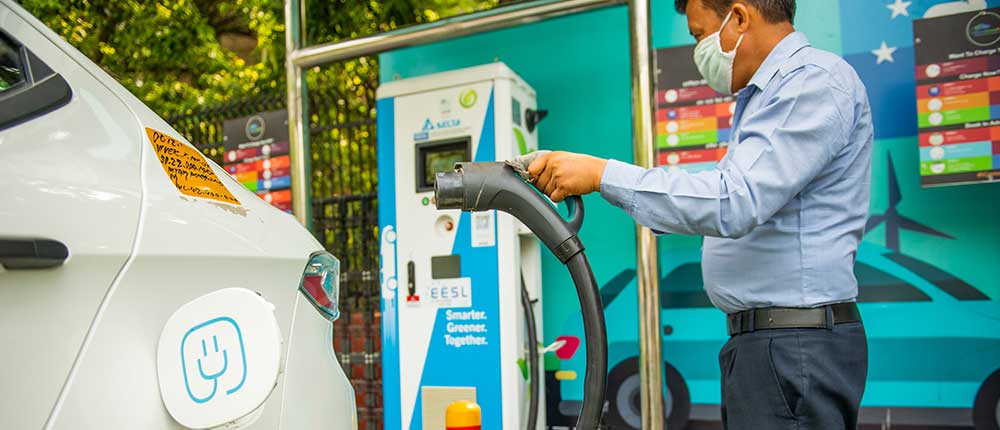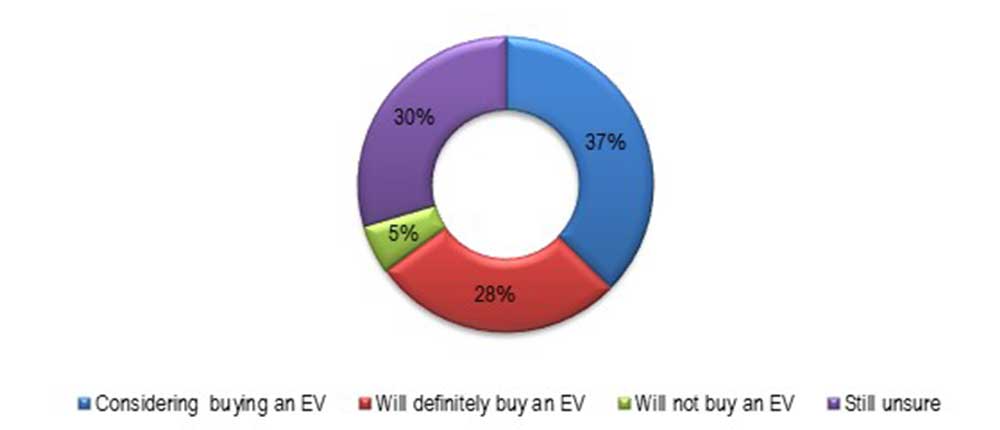TERI's survey on consumer perception of electric vehicles (EVs) revealed that issues like upfront cost, battery replacement, and range anxiety are topmost concerns for people considering buying an EV.

Electric Vehicles (EVs) have the potential to contribute to reduction of air pollution, carbon emissions, and oil dependency in India. No wonder then, that in recent years policy makers and environmentally conscious citizens have been increasingly looking into wider EV adoption. The government's policies and targets for EV sales have also encouraged their production and adoption in India.
According to the Society of Manufacturers of Electric Vehicles (SMEV), 3,400 electric cars and 1.52 lakh electric two-wheelers were sold in India in financial year (FY) 19-20. The total sales grew by 20% compared to the previous financial year. However, current EV penetration in India is low despite the government's measures.
In order to understand consumer perception of EVs in India, TERI conducted an online survey considering various factors that affect vehicle purchase decisions. According to the survey findings, there exists a significant difference in the expectations of those who own an EV and those who do not. EV owners do not assign much importance to availability of a used-car market and the vehicle's resale value, which were among the issues the survey sought to find responses on. The difference in consumer perception of the two groups is directly related to the knowledge and experience of EVs. The survey findings also reveal that household income is statistically insignificant and does not affect EV purchase decisions.
Consumer expectations from EVs were found to vary based on certain factors, one of which was age group of the respondent. In the survey, 41% and 71% of respondents under the age of 25 found the existence of an EV used-car market and the vehicle resale value, respectively, important. These consumers are more likely to procure a vehicle from the used-car market and hence the upfront cost of the first-hand EV is not a major concern for them. This is due to the income level and the desire to replace existing vehicles periodically.
The survey also revealed that on an average, all respondents make a short distance trip (less than 10 km) at least five days a week but medium (up to 100 km) and long distance (up to 160 km) trips are rare. The ability of EVs to cover a limited distance in comparison to Internal Combustion Engine (ICE) vehicles has an impact on consumers' perception and highlights the important issue of range anxiety. However, the EVs currently available in the market are capable of completing short and medium distance trips conveniently. Over 70% of the respondents are aware of this, and 75% are aware of how much EVs cost.
Among the people who do own an EV, over 73% also said that they have more than three years of driving experience, thus suggesting that people with significant driving experience are more likely to own an EV.
Choice of Brands
Brand awareness also impacts consumers' idea of EVs available in the market. In our survey, 47.61% of the respondents said they were likely to purchase an EV from established brands only. However, 52.39% showed willingness to buying an EV from a new entrant or a lesser-known brand if adequate customer support is provided. This suggests that there is an opportunity for new brands to enter and compete with the established players. This market is still relatively new and those who can understand and respond to consumer needs will have an advantage over competitors.
An encouraging finding was also that, around 37% of the survey respondents revealed that they are considering buying an EV in the near future while 28% are certain that they will buy one in the future

Challenges to purchasing an EV
- High Upfront Cost
The survey showed more than 70% of the respondents believe that the running cost of EVs is cheaper than that of the available petrol/CNG/diesel variants. However, Indian customers are very price sensitive and the high upfront costs make EVs unattractive to many. For their mass adoption, especially among middle-class consumers, the difference between the upfront cost of EVs and ICE vehicles will have to come down. - Range Anxiety
The maximum distance that an EV car can go up to on a single charge is around 200 km. This number is steadily increasing with newer models. While the survey respondents cited driving range as a concern, their responses indicated that they rarely make trips long enough to exhaust their electricity supply midway as the driving range offered by current EV models can meet the needs of general, inter-city travel. However, the need for adequate charging infrastructure cannot be denied. - Battery Replacement Cost and Lack of Skilled Manpower
Maintenance and battery replacement costs had a major bearing on purchase decisions among the survey respondents. As EVs in India are still relatively new, the lack of skilled local mechanics and the high battery replacement cost were found to be major factors in making people wary of buying EVs. As per the survey response and user experience, the fact that consumers need to visit the manufacturer's service centre to get EVs repaired, which costs time and money, is a deterrent to EV adoption.
Conclusion
For a new technology to be adopted, the consumer should be aware of it and perceive it to have more value than the existing technology. Our perception survey found that a majority of the respondents are not well aware of EV technology as a whole.
With the driving range of EVs rising and their cost falling, driven by reduction in battery prices over the last few years, consumer perception seems to have emerged as the final barrier to their large-scale adoption.
This survey throws light on the major factors that influence EV purchase decisions. While range anxiety appeared to be the topmost stumbling block, an interesting facet was that concerns related to high upfront costs were accompanied by concerns around existence of a used-car market and the vehicle's resale value. The cost and frequency of battery replacement was also considered important.
The issue of choice of brands also appeared important to consumers. It is clear from the analysis that both existing and potential customers have similar concerns and that has its impact on the individual EV purchase and ownership.
The survey found that lack of awareness about EV features and charging prevents even those who can afford the high upfront costs from buying such vehicles. Among the other consumers, there can be mass adoption only when the upfront cost is competitive as compared to ICE vehicles. Overall, however, consumer sentiment is positive and it appears they would prefer electric travel as it is more environment friendly.
